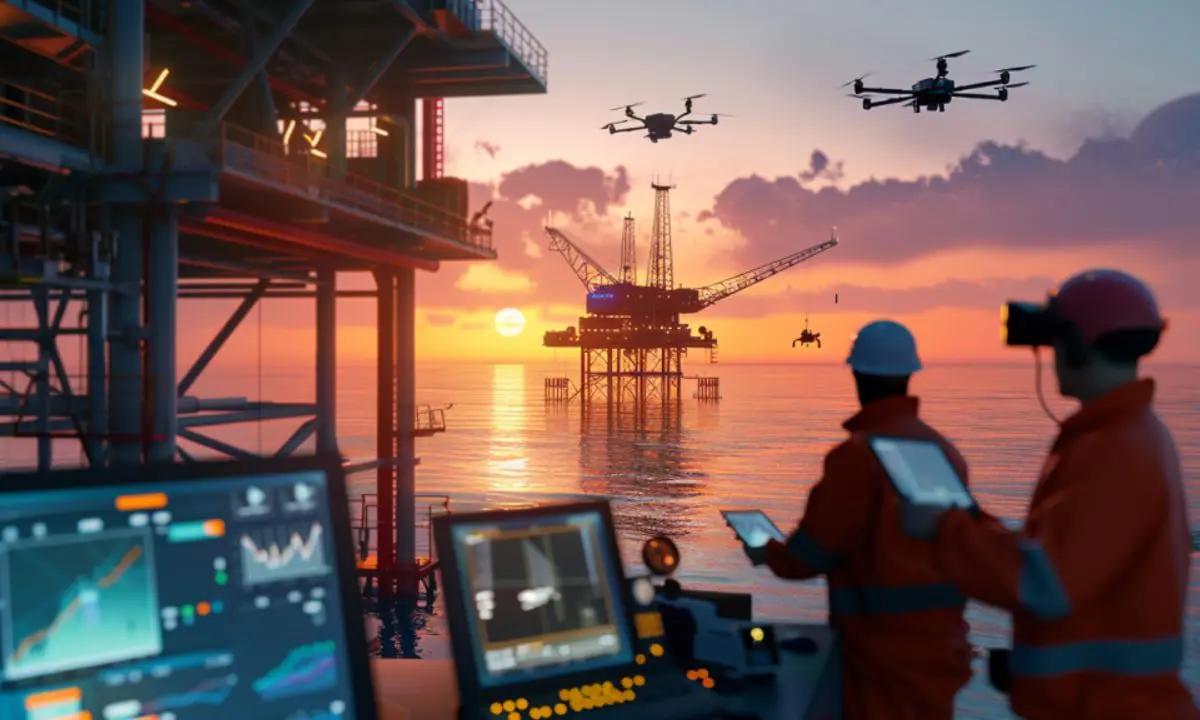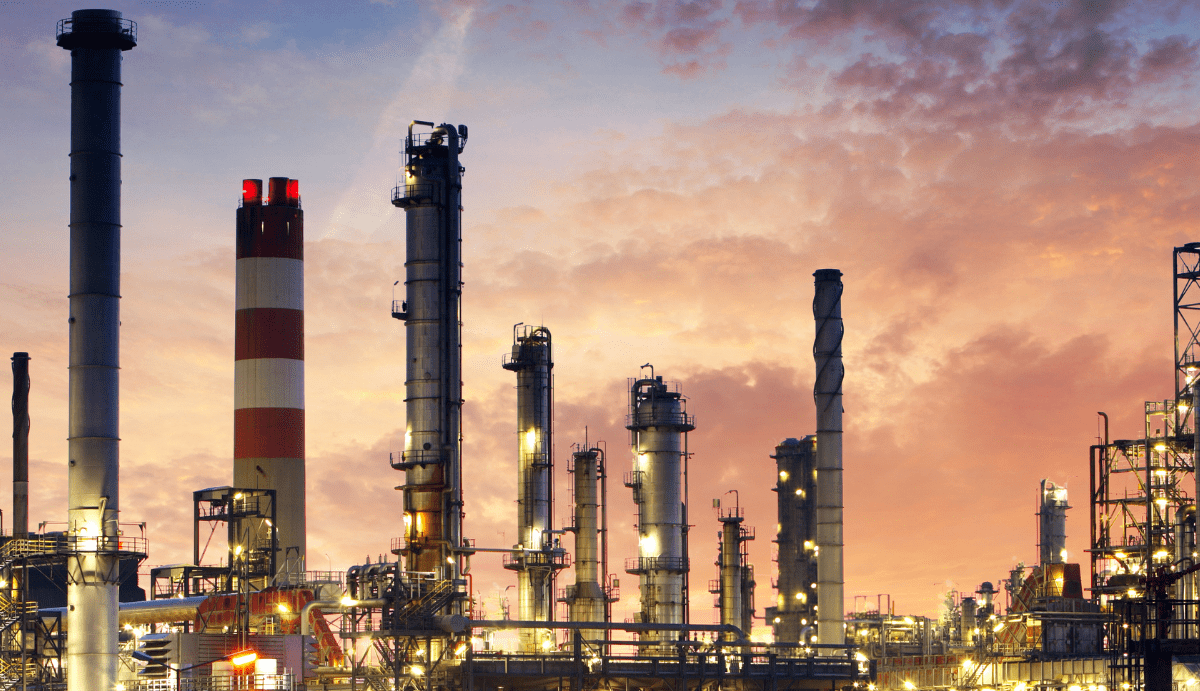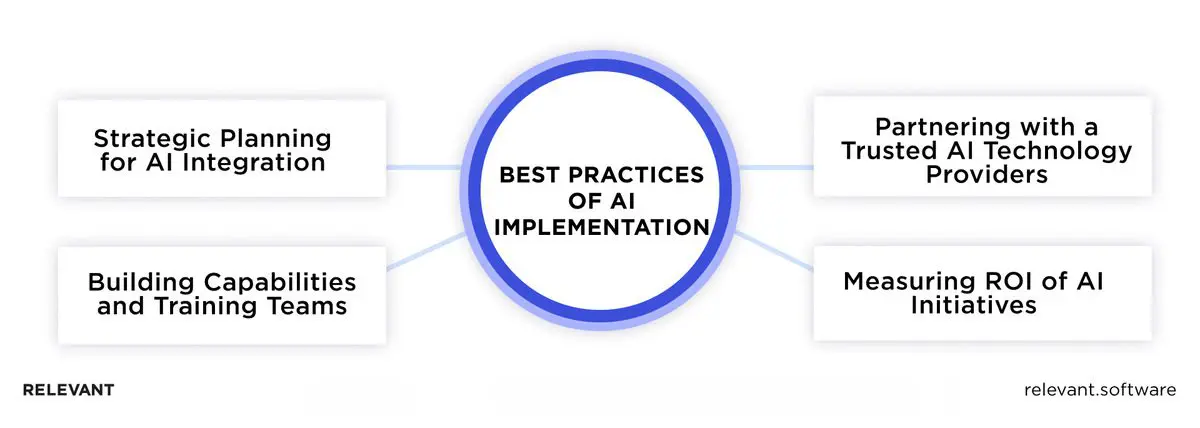The Energy Transformation: Implications of AI in Oil and Gas Operations

There’s an ongoing debate surrounding artificial intelligence, or AI, in oil and gas industry. Some leaders view it as a risk multiplier, while others see a path to safer operations, higher uptime, and better economics.
Reality tends to sit between those extremes. Most organizations introduce AI through controlled pilots, clear governance, and staged rollout plans. EY’s Future of Energy Survey reports that 71% of Oil & Gas and Chemicals respondents say their organizations use AI today. That level of adoption signals real momentum and creates a performance gap: companies that operationalize AI with high-quality data and monitoring gain sharper visibility into their assets and processes than their peers, who still rely on slower, less reliable signals.
from 25 countries outsourced software development to Relevant
We provide companies with senior tech talent and product development expertise to build world-class software.
Technology and industrial software vendors, including our team at Relevant, already deploy AI across multiple domains, yet energy programs often move more slowly than their potential allows. That leaves room for practical improvement, from maintenance planning to field workflows. For teams that still feel uncertain, this guide explains where AI delivers measurable value and why investing in AI for oil and gas makes sense as a disciplined, business-led decision.
The Current State of AI in Oil and Gas Industry
Although AI’s first use in oil and gas dates back to the 1970s, the industry began actively exploring AI opportunities just a few years ago, aligning with AI’s rapid advancements and the shift towards Oil and Gas 4.0.
AI in oil and gas market is projected to yield substantial ROI, with market valuation potentially rising from $3.5 billion in 2024 to $13 billion by 2034. The solution segment is expected to lead this growth. This indicates a growing demand for pre-built and industry-specific AI solutions and touches all oil and gas industry processes: exploration and production (upstream), transportation and storage (midstream), and refining and marketing (downstream).

AI Technologies Pioneering Change
AI, by nature, covers a wide spectrum of technologies that transform the oil and gas sector. Here are just some of those making the biggest impact.
Machine Learning & Predictive Analytics
Machine learning and predictive analytics are at the forefront of such transformation. By analyzing massive amounts of data coming from sensors, ML algorithms clearly identify patterns and predict equipment failures, reservoir performance, and even optimal drilling locations. This, figuratively speaking, proactive approach minimizes downtime, improves efficiency, and reduces risks.
Robotics and Automation
AI-powered robotics and automation are pivotal in mitigating human risk in hazardous environments. Robots are sent out to check pipelines, perform underwater tasks, and complete wells. Automating these jobs enhances safety and allows human employees to concentrate on more complex activities. The benefits of AI in oil and gas are twofold: operational costs are reduced, and safety levels are heightened.
Internet of Things (IoT)
The IoT implementation, too, is pivotal in achieving seamless operational integration, offering real-time monitoring and analytics across the value chain. A network of sensors embedded in equipment and throughout oil and gas infrastructure generates constant data streams. With IoT in oil and gas, manufacturers worldwide can now examine data as it comes, leading to more effective predictive maintenance, refined process oversight, and smarter decision-making.
Currently, the oil and gas sector can utilize AI, ML, and IoT technologies to tackle a broad spectrum of existing challenges, including but not limited to:
- Processing extensive data volumes;
- Rising operational expenses;
- Equipment failure risks;
- Adverse environmental impacts;
- Diminishing operational efficiency;
- Intensifying competition;
- Fluctuating demand.
AI in Exploration and Production (E&P)
The main challenge in upstream operations is the uncertainty and risk involved in finding and managing oil and gas reserves. Despite the high costs of exploration, finding economically extractable reserves is not guaranteed. Thankfully, AI in oil and gas helps speed up exploration, drilling, and reservoir management, reducing time on site and injury risks.
- Seismic Data Interpretation: Seismic surveys analyze sound waves to image subsurface geology. However AI software can automate this complex process, identifying potential oil and gas reserves with greater accuracy and speed.
- Drilling Optimization: Drilling is a costly and time-consuming endeavor. However, machine learning algorithms save the day by analyzing existing data from drilling operations to optimize well placement, reduce drilling times, and minimize risks.
- Reservoir Management: Once a reservoir is discovered, managing its production efficiently is crucial. Artificial intelligence oil and gas can analyze reservoir data to predict production decline, optimize well-completion strategies, and maximize resource recovery.
| Upstream Activity | Developed Tool | AI Approach | Main Effect |
| Geological Assessment | Automated mapping tool for reservoir rock properties | Non-gradient optimization + interpolation techniques | Reduced manual mapping from weeks to seconds, enhancing accuracy in hydrocarbon target definition |
| Geological information extraction from well logs | Gradient boosting | 100+ times speedup in process | |
| Rock typing from well sample images | Deep neural networks | Approximately 1,000,000 times speedup | |
| Drilling | Real-time drilling telemetry for rock type and failure detection | Combination of machine learning algorithms | Saves up to 20% time and 15% in well construction costs, maximizes wellbore to pay zone contact |
| Reservoir Engineering | Conventional reservoir simulation acceleration | Deep neural networks | Speeds up simulations by 200 to 2000 times, enabling optimal field development scenario selection |
| Production Optimization | Objective forecast tool for well treatment campaign efficiency | Gradient boosting + expert-based feature selection | Provides 100+ times faster well treatment effect estimation, leading to up to 20% investment margin growth |
Source: ScienceDirect
AI in Refining and Distribution
Focused on margins, downstream companies benefit from AI optimizing production processes, from refining to petrochemical production, leading to higher output and lower waste. In general, utilizing artificial intelligence in oil and gas leads to:
- Supply Chain Optimization: AI in oil and gas market can analyze vast amounts of production, transportation, and storage data to optimize the supply chain. This leads to reduced costs, improved delivery times, and better inventory management.
- Predictive Maintenance: Refineries rely on complex tools that require regular maintenance. This oil and gas artificial intelligence equipment can analyze sensor data to predict failures before they occur, avoid expensive shutdowns and ensure smooth operations. Also, such technology as digital twins (data-driven virtual replica of a physical asset or process) enhances predictive maintenance by simulating complex drilling operations.
- Energy Efficiency: AI oil and gas software can analyze data from refineries and pipelines to identify areas for energy waste reduction. This not only saves costs but also minimizes the industry’s environmental footprint.

Impact of AI on Oil and Gas Operations
AI in oil and gas is not just changing how things are done, it’s bringing significant improvements across the board. Let’s explore the table with some key areas where AI is making a positive impact:
| Area of Impact | Description | Example |
| Enhancing Exploration Efficiency | AI hastens the discovery of oil and gas, sifting through seismic data to pinpoint potential drilling locations, boosting the chances of success. | ExxonMobil used AI in the Guyana Basin to discover new oil deposits efficiently. |
| Transforming Production Operations | AI optimizes drilling with real-time data analysis, adjusting drilling parameters to increase efficiency and reduce costs. | Shell Oil Company implemented an AI system to reduce drilling times and improve wellbore quality. |
| Streamlining Downstream Processes | AI predicts refinery equipment failures, enabling proactive maintenance and preventing costly downtime. | BP utilizes AI for predictive maintenance, minimizing disruptions and saving costs. |
| Safety Improvements and Risk Reduction | AI-powered robots take on hazardous tasks like pipeline inspections, reducing workplace accidents and ensuring safety. | Equinor actively deploys AI-equipped robots for safe pipeline inspections, avoiding human exposure to danger. |
Challenges and Limitations of AI in Oil and Gas
While artificial intelligence (AI) promises to transform the oil and gas industry, its implementation is not without challenges. Each of these obstacles must be addressed to leverage AI’s potential fully.
Data Quality and Availability
High-quality, comprehensive data is crucial for AI in oil and gas to deliver accurate predictions and deep insights. However, the oil and gas sector often grapples with data that is either incomplete, inconsistent, or siloed across different departments. This limitation can hinder AI systems’ ability to learn effectively and produce reliable outcomes. Maintaining data accuracy and promoting a culture of data exchange are critical measures to address this issue.
Integration with Existing Systems
Incorporating AI innovations into established operational systems presents a considerable obstacle. Numerous oil and gas firms rely on outdated infrastructures, which often lack immediate compatibility with modern AI technologies. To facilitate a smooth integration of these advanced solutions without interrupting current processes, there is a need for meticulous strategy development and substantial financial input to either update the existing systems or create interfaces that enable effortless incorporation.
Skilled Workforce Requirements
The successful deployment of AI in oil and gas necessitates a workforce that is skilled in traditional industry knowledge and proficient in AI and data analytics. The scarcity of skilled professionals is a significant hurdle for AI’s broader integration. To overcome this, companies must invest in comprehensive training programs to enhance their team’s capabilities and draw in fresh talent equipped with the necessary technical know-how.
Ethical and Environmental Consideration
Using AI in oil and gas sector raises real concerns about ethics and the environment. AI’s decisions can seriously impact our efforts to protect the planet and live sustainably. That’s why it’s essential for companies to focus on creating AI that’s mindful of these issues. They should aim to use AI to make their operations more efficient, reduce waste, and stay in line with environmental rules.
Best Practices for Implementing AI in Oil and Gas
To smoothly embrace AI in oil and gas processes, it’s essential to stakeholders address these key prerequisites thoughtfully:

Strategic Planning for AI Integration
First, ensure your oil and gas AI initiatives align with your business goals. So, it’s recommended to focus on areas where AI can significantly impact production efficiency or exploration success. Begin with a small, focused pilot project to learn and refine your approach before scaling up. Besides, because high-quality data is foundational for AI success, you must invest in robust data management systems.
Building Capabilities and Training Teams
Because most AI projects benefit from collaboration across disciplines, you must combine the expertise of data scientists, engineers, and domain specialists. Evaluate your team’s understanding of data science and AI and develop training to fill any gaps. Cultivating a data-driven culture is also vital, where insights from data across all organizational levels inform decisions.
Partnering with Trusted AI Technology Providers
Working with experienced AI providers can make a big difference. Look for an oil and gas software development company with a strong track record in the oil and gas industry and successful AI implementations. Make sure you both agree on specific goals, what you expect, and a schedule. Prefer AI options that are straightforward and understandable, which helps gain users’ trust.
Measuring ROI of AI Initiatives
It’s important to know whether your oil and gas industry AI investments are paying off. Set up clear ways to measure success, like cost savings, efficiency gains, or fewer safety incidents. Monitor these metrics to see how well AI is working for you and where you might need to adjust your approach.
Read here about – How to Create an AI System
Final Thoughts on AI in Oil and Gas
As you can see, driving innovation with AI in the oil and gas industry can be complex and demanding, requiring attention to numerous details. Yet, partnering with a company such as Relevant can make AI software development effortless for your business. We force the whole digital transformation of your oil and gas enterprise, developing bespoke AI software solutions that align with your specific requirements. Contact us to hire AI engineers and begin crafting your software!


Hand-selected developers to fit your needs at scale! Let’s build a first-class custom product together.

